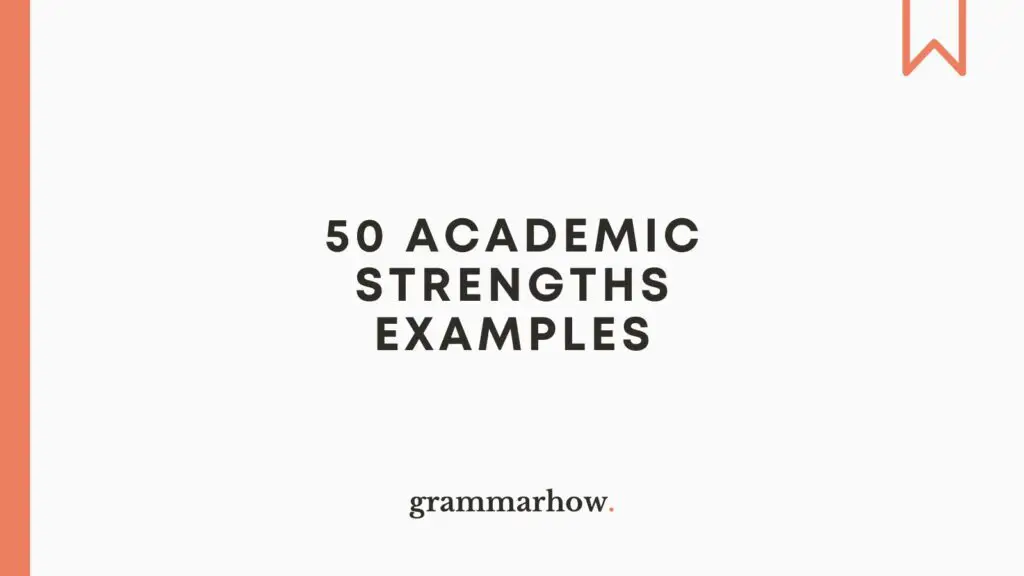Have you been asked about your academic strengths and wondered what they could be? Luckily, there’s an easy way to find out.
This article will explain everything to know about academic strengths. We’ll help you sell your strengths and show an employer, teacher, or reviewer that you’re worth more than they know!
What Are Some Academic Strengths?
- Adaptability
- Analysis
- Attention to detail
- Commitment
- Communication skills
- Conflict resolution
- Creativity
- Critical reading
- Critical thinking
- Cross-cultural communication
- Curiosity
- Delay gratification
- Dependability
- Determination
- Digital literacy
- Diligence
- Efficiency
- Focus
- Growth mindset
- Humility
- Imagination
- Impulse control
- Independent learning
- Initiative
- Interpersonal skills
- Leadership
- Note-taking
- Objectivity
- Open-mindedness
- Oral communication
- Organization
- Perseverance
- Persistence
- Personal responsibility
- Positive self-control
- Prioritization
- Problem-solving skills
- Professionalism
- Referencing
- Reliability
- Self-belief
- Self-reflection
- Social networking
- Specialization
- Stress management
- Summarizing
- Teamwork
- Time management
- Work ethic
- Writing skills
Academic Strength Examples for College Interviews
Generally, different academic strengths apply to different situations. For a college interview, you’ll want to highlight strengths that make you appear mature, confident, and resourceful.
For example, these are some of the best academic strengths for students:
- Critical thinking
- Humility
- Independent learning
- Leadership
- Perserverance
- Reliability
- Self-reflection
- Teamwork
- Time management
But what makes these strengths so impressive in a college interview?
Each strength shows an interviewer that you have skills that will set you apart from other students. You can relate to the interviewer when explaining your strengths.
Let’s take an example with teamwork. While you won’t always be required to work on a team at college, being able to work with one is a great asset. It shows you value the input of others and are willing to listen to ideas and open yourself to new challenges.
Academic Strengths Examples for IEP
You will also need to list academic strengths for IEP (independent education plans). This gives you a chance to show teachers what your child with special education needs is capable of.
Here are some great examples of academic strengths to use:
- Adaptability
- Creativity
- Growth mindset
- Imagination
- Open-mindedness
The key with IEP learning is creativity and openness. Any student that can use creativity as their strength will set themselves apart from others. This is great to include when trying to show teachers why you or your child deserves a place in an IEP program.
Having a growth mindset also lets teachers know that your child is capable of growth. It shows they’re willing to learn and adapt to new stimulus when given the correct challenges.
Academic Strengths of a Child
Is your child applying to kindergarten or 1st grade? Well, you still need to list academic strengths to help them out. Of course, you don’t need to be as detailed when applying to lower education, but it still helps.
Some of the following academic strengths are great to share for a child:
- Diligence
- Focus
- Leadership
- Persistence
- Self-belief
- Teamwork
The most useful academic strengths to children are those that are easy to develop and maintain at young ages. Things that allow them to work well with others and focus on their work are going to be the most important.
Of course, you’re free to share whatever strengths you deem relevant for your child. We recommend keeping it fairly simple; otherwise, it might sound like you’re trying to oversell them to a teacher.
What Does Academic Strengths Mean?
Academic strengths means any skills or traits that give children and students and advantage in education. Academic strengths are carried with people throughout their lives, so the earlier you can instill them, the better off children and students will be.
You’ll find a lot of academic strengths also apply to the workplace. That’s why it’s so important to develop them early.
Don’t worry, though. If you don’t currently have these academic strengths, you can still develop them. There are plenty of ways for you to learn them overtime with effort and understanding!
Academic Weaknesses
An academic weakness is something that hinders someone’s academic performance. They will often be unable to control the weakness, though it’s possible to work on weaknesses and try to make them more manageable.
Where there are strengths, there are also weaknesses. Academic weaknesses aren’t as important, and you might not be asked about them.
Still, it’s worth knowing a few things about common weaknesses.
Here are some common weaknesses that can affect any of us:
- Procrastination
- Fear of failure
- Apathy
- Disruptive
- Lack of focus
- Incapable of teamwork

Martin holds a Master’s degree in Finance and International Business. He has six years of experience in professional communication with clients, executives, and colleagues. Furthermore, he has teaching experience from Aarhus University. Martin has been featured as an expert in communication and teaching on Forbes and Shopify. Read more about Martin here.

